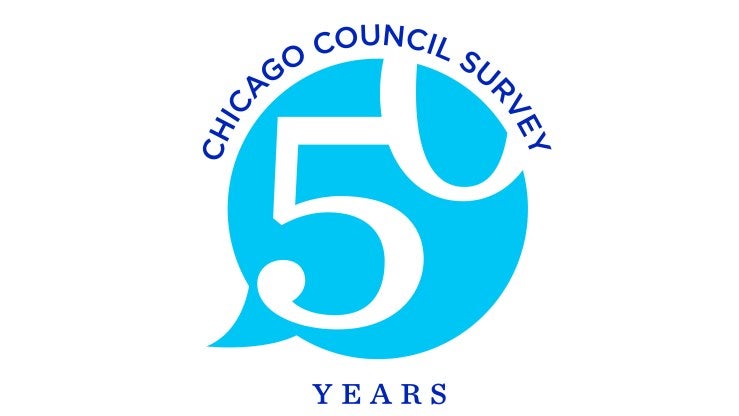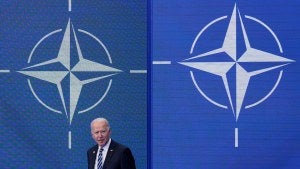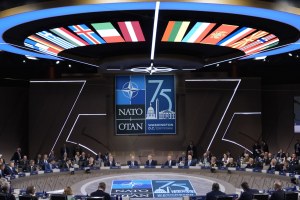While supporters of both parties see benefits in US security agreements, Republicans tend to be more concerned about the associated costs.
For the past 75 years, the US alliance system has been at the heart of American foreign policy. Support for this system has been broadly bipartisan over its history, but Donald Trump’s emergence as the Republican Party’s leader has shaken that foundation. Both in office and now as a candidate, he has called into question US commitments around the world and taken a transactional approach to international ties. If he wins a second term, speculation abounds about how the US alliance system will shift. Even if he loses the 2024 election, a broader re-evaluation may be under way among the Republican public.
The 2024 Chicago Council Survey finds broad support among Americans for alliances, but there are differences in the intensity of partisan support on key issues. While Democrats champion the benefits of these US security agreements, a sizable minority of Republicans believe that the costs of collective security are disproportionately underwritten by the United States.
Key Findings
- Maintaining US military alliances (46%) and maintaining US military superiority (48%) are the items rated most highly as very effective ways to achieve US foreign policy.
- A majority of Americans (64%) say US security alliances around the world are beneficial to both allies and the United States (51%) or just the United States (13%). But there are partisan divides: 74 percent of Democrats take that view versus 55 percent of Republicans.
- Among the four in 10 Republicans (39%) who think security alliances mostly benefit our allies, 64 percent say this is because US allies do not pay their fair share.
- Americans think US relations with Taiwan (62%), Ukraine (59%), and Israel (55%) do more to strengthen US national security.
- Majorities also support long-term military bases in Germany (64%), South Korea (63%), and Japan (62%). Half oppose long-term military bases in Turkey (50%), and Americans are evenly split on bases in Australia (48% support and oppose).
- Half say the US military presence in Europe (50%) increases stability, and pluralities say the same about Asia (49%) and the Middle East (39%). When it comes to Africa (49%) and Latin America (44%), pluralities say it has no effect.
Maintaining Alliances and Superior Military Power Seen as Best US Tools
For the past seven decades, US officials have generally viewed the US alliance system as a geopolitical strength for the United States—one that is unmatched by competing powers. In recent years, however, some Republican leaders have suggested that alliances are more of a burden than an asset, primarily due to their perceived unequal costs.
For their part, the American public recognizes the value of US security relationships with other countries, especially those considered US allies. Americans think US relations with most of the countries asked about, including official allies like Germany (75%), Japan (74%), and South Korea (69%), strengthen US national security rather than weaken it. They also feel America’s less official partnerships with Taiwan (62%), Ukraine (59%), Mexico (60%), and Israel (55%, down from 64% in 2023) strengthen US security.1
Moreover, of all the potential tactics in the United States foreign policy toolbox, maintaining US military alliances (46% very, 43% somewhat effective) and maintaining US military superiority (48% very, 36% somewhat) are the items rated most highly as very effective ways to achieve US foreign policy goals. This has been true since the Chicago Council Survey first began asking this question in 2012.
Consistent with past surveys, Republicans rate superior military power (63% very effective) higher than alliances (41%); Democrats rate alliances (56% very effective) higher than military power (42%). Independents rate them about equally (40% alliances, 42% military power).
Alliances Seen as Mutually Beneficial, but Partisan Gaps Emerging
Scholars who focus on alliances point out that their benefits are often less visible, and therefore less understood, than the costs associated with them. But Americans are fairly strong proponents of US alliances. Nearly two-thirds of Americans (64% combined) say US security alliances around the world benefit both the United States and its allies (51%) or mostly benefit the United States (13%).
Democrats are most emphatic about the positives of alliances. In total, 74 percent say alliances benefit either the United States and allies (58%) or the United States alone (16%). One-quarter (24%) say alliances mostly benefit allies (19%) or benefit neither (5%). Republicans are more divided. While 55 percent of Republicans say alliances benefit either the United States (10%) or the United States and allies (45%), a sizable minority (39%) say it mostly benefits the allies (and 4% say neither). Independents are in between: six in 10 consider alliances to mostly benefit either the United States or the United States and its allies (62% combined), but nearly four in 10 think otherwise (26% allies, 11% neither).
Democrats’ robust backing for alliances also reflects their greater inclination to support multilateral approaches to foreign policy and to prioritize leading international cooperation in US foreign policy. For example, seven in 10 Democrats agree that the United States should be more willing to make decisions with its allies even if it results in a policy that is not the United States’ first choice (71%, higher than the overall average of 58%). While a majority of Independents also agree (58%), just 46 percent of Republicans are of the same mind (and 53% disagree).2
Reasons for Supporting Alliances: Diplomatic and Military Strength
Those respondents who think alliances mostly benefit the United States and its allies (64% of the overall sample) were further asked why they held this view. The most frequent response is that alliances strengthen US diplomatic efforts around the world (57%). And 50 percent say alliances strengthen US military efforts around the world. The deterrent aspect of alliances is less recognized, though a sizable minority associate alliances with preventing the United States from being attacked (38%) and 31 percent say they strengthen US national security. For the most part, these views are distributed similarly across partisans, though Democrats are most inclined to credit alliances for fortifying diplomatic efforts.
Reasons for Opposing Alliances: Costs of Defense and Ally Burden-Sharing
Those who say alliances mostly benefit US allies or benefit neither country—35 percent of the sample overall—seem most concerned about costs. Nearly half (47%) say allies do not pay their fair share and 45 percent think alliances increase the cost of defense for the United States. Republicans are particularly inclined to say that allies do not pay their fair share (64 percent versus just 30 percent among Democrats).
Majority Support for NATO
Despite Republicans’ concerns about costs of alliances in general, in the specific context of NATO, six in 10 Republicans and Independents say it is still essential to US security (61% Republicans, 60% Independent, 83% Democrats). In addition, Republicans also endorse keeping the US commitment to the transatlantic alliance, along with other partisans (68% Republicans, 73% Independents, 88% of Democrats).3
American Military Presence
A core component of the US alliance system is the presence of US military personnel around the globe, with more than 700 military bases in roughly 80 countries. While advocates of the US forward presence claim these bases are a stabilizing force around the world that helps to deter adversaries, opponents often cite evidence of unequal cost-sharing. The American public falls somewhere in between, often taking its view on a region-by-region basis.
Majorities or pluralities say the US military presence increases stability in Europe (50%), the Asia Pacific (49%), and the Middle East (39%). However, in Africa (49%) and Latin America (44%), pluralities think the US military presence has no effect on regional stability.
But when it comes to bases in specific countries, Republicans and Democrats are often in agreement. For Republicans, this is likely because they see these bases as helping to ensure the physical defense of the United States. For Democrats, they may be seen as helpful in bolstering US diplomatic efforts.
Majorities support these bases in Germany (64%), South Korea (63%), Japan (62%), the Philippines (54%), NATO allies like Latvia, Lithuania, and Estonia (54%), and Poland (53%). In each case, majorities of Democrats, Republicans, and Independents are in support.
However, there are two notable exceptions to broad public support for US military bases abroad. The first is Australia. Here, 48 percent are in support with only a small gap between Republicans (52%) and Democrats (46%). The second is Turkey, where half of Americans (50%) oppose long-term US bases—and 46 percent support US bases. Half of Democrats and Republicans (50% each) along with 52 percent on Independents oppose US bases here.
Conclusion
While the benefits of US alliances are often unseen and sometimes difficult to articulate, the majority of Americans are convinced of their value. They see alliances as adding backbone to US security and US diplomatic and military efforts. Even as the economy and inflation play a large role in the upcoming 2024 US election, and costs being a key factor among those who do not see benefits to the United States, the prevailing view is that alliances are worth US participation.
- 1
They are more divided on Saudi Arabia (46% strengthen vs. 48% weaken).
- 2
See Appendix for full results.
- 3
For more about US attitudes toward NATO, see Council report “As NATO Reaches 75th Year, Americans Still View It Is Still Essential to US Security.”
This analysis is based on data from the 2024 Chicago Council Survey of the American public on foreign policy, a project of the Lester Crown Center on US Foreign Policy. The 2024 Chicago Council Survey was conducted June 21–July 1, 2024, by Ipsos using its large-scale nationwide online research panel, KnowledgePanel, in English and Spanish among a weighted national sample of 2,106 adults 18 or older living in all 50 US states and the District of Columbia. The margin of sampling error for the full sample is ±2.3 percentage points, including a design effect of 1.1229. The margin of error is higher for partisan subgroups (±4.2 points for Republicans, ±3.9 points for Democrats, and ±3.8 points for Independents.) or for partial-sample items.
Partisan identification is based on how respondents answered a standard partisan self-identification question: “Generally speaking, do you think of yourself as a Republican, a Democrat, an Independent, or what?”
The 2024 Chicago Council Survey is made possible by the generous support of the Crown family, the Korea Foundation, and the United States-Japan Foundation.





Related Content
 Public Opinion
Public Opinion
Results and analysis of the Council's annual survey of American views on foreign policy.
 US Foreign Policy
US Foreign Policy
The public continues to believe such security relationships benefit both the United States and its allies.
 US Foreign Policy
US Foreign Policy
But everyday Republicans are divided over the best way to encourage NATO allies to increase their defense spending.
 US Foreign Policy
US Foreign Policy
Majorities of young Americans agree the alliance is essential to US security but at lower levels than older generations.


